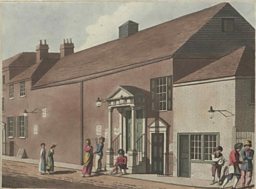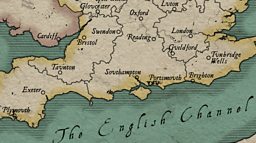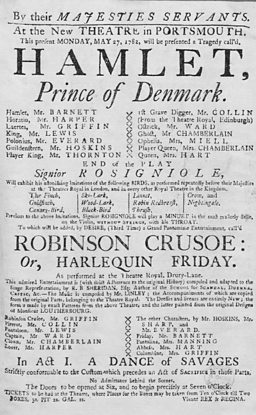Hamlet's pirates resonate in naval Portsmouth
In Britain’s traditional naval stronghold of Portsmouth audiences take to their seats to watch Shakespeare’s Hamlet, as many miles away the British fleet were engaged in trying to block the revolutionary war for American Independence, a conflict the British Empire was losing.
It’s a Monday night in May 1782, and there’s a quality acting line-up on stage at Portsmouth’s New Theatre. But this is no ordinary night. These are extraordinary times as Portsmouth – one of Britain’s naval powerhouses – would know all too well.
-
![]()
Much ado near me
Hear more Shakespeare stories on BBC Radio Solent
-
![]()
Shakespeare Festival 2016
The BBC celebrates the genius of the bard

The American war of independence was raging, which Britain was trying to quash, as other countries, such as France, supported the American cause.
“To be, or not to be: that is the question:
Whether 'tis nobler in the mind to suffer
The slings and arrows of outrageous fortune,
Or to take arms against a sea of troubles,
And by opposing end them?"
Hamlet, Act 3, Scene 1
Hamlet is a good choice in a town whose business is the sea - and for which his sea voyage would have a particular resonance.
In Act 4, Scene 3 Claudius sends Hamlet away on a sea voyage because of the murder of Polonius. If the prince has an “accident” on this journey then the king, his uncle, can claim to be innocent. When the prince is taken away, Claudius reveals that he is sending a note to the King of England informing him that when he arrives, Hamlet should be executed.
However all does not go according to plan as pirates attack the ship. In the battle, the pirates took Hamlet captive; they treat him well and return him to Denmark, in exchange for a favour.
A shiver of recognition may have rippled through the spectators as pirates were an ever present threat on the high seas. Family connections with the expanding naval dockyard may have meant that some had first-hand experience or had heard many tales of the brutalities inflected by these raiders. Hamlet’s silver tongue may have gained a charitable response from his captors, the reality for those captured was less pleasant.
Ere we were two days old
at sea, a pirate of very warlike appointment gave us
chase. Finding ourselves too slow of sail, we put on
a compelled valour, and in the grapple I boarded
them: on the instant they got clear of our ship; so
I alone became their prisoner. They have dealt with
me like thieves of mercy, but they knew what they
did; I am to do a good turn for them.
Hamlet, Act 4, Scene 6

Portsmouth’s Growing Population – and appetite for quality productions
The playbill – part of the British Library collection – promotes the quality of the actors this night. It’s a good company, one which came from a theatre that had acquired a Royal Patent so they could call themselves “His Majesties Servants”.
Mr Barnett is Hamlet and Mrs Miell is Ophelia and the cast includes other well-known actors from the era including Mr Collin who is fresh from the Theatre Royal, Edinburgh, in the tragic comic role of the grave-digger.
The venue for the drama is a building dubbed the New Theatre in Portsmouth. At the time there were few patented theatres but magistrates could licence visiting circuit companies to perform for a limited number of days.
At this stage, Portsmouth had not received a Royal Patent so it could not boast the grand title. But it was a growing town so could yield a good audience.
Rows of houses had been built in the dockyard for senior officers to be close to their work. A naval academy had opened in 1733 and Portsmouth Grammar school in 1750.
A new suburb called Portsmouth Common sprang up to cater for the increase in population and ten years after this playbill, in 1792, it changed its name to Portsea. From 1764 a body of men called the Improvement Commissioners was set up who looked after paving and keeping the streets clean.
There was also a man called a scavenger who collected rubbish, with a cart, once a week and this scheme was extended to Old Portsmouth. In 1776 streets were lit with oil lamps making it easier for citizens to go out in the evenings.

Shakespeare on Tour
From the moment they were written through to the present day, Shakespeare’s plays have continued to enthral and inspire audiences. They’ve been performed in venues big and small – including inns, private houses and emerging provincial theatres.

BBC English Regions is building a digital picture which tracks some of the many iconic moments across the country as we follow the ‘explosion’ in the performance of The Bard’s plays, from his own lifetime to recent times.
Drawing on fascinating new research from Records of Early English Drama (REED), plus the British Library's extensive collection of playbills, as well as expertise from De Montfort University and the Arts and Humanities Research Council, Shakespeare on Tour is a unique timeline of iconic moments of those performances, starting with his own troupe of actors, to highlights from more recent times. Listen out for stories on Shakespeare’s legacy on your BBC Local Radio station from Monday 21 March, 2016.
You never know - you might find evidence of Shakespeare’s footsteps close to home…
Craig Henderson, BBC English Regions
Related Links
Shakespeare on Tour: Around the Solent
-
![]()
Shakespeare's flagship acting company comes to Bridport
However the company were then turned away in 1624
-
![]()
Ira Aldridge visits Southampton
The first black Shakespearean actor Ira Aldridge performing in the role of Othello
-
![]()
Shakespeare's men perform before the King at Wilton in Salisbury
A royal audience in Salisbury
-
![]()
Shakespeare and Hampshire - where his footprints are lost in time
Is there any written evidence linking Shakespeare to Southampton?
Shakespeare on Tour: Around the country
-
![]()
The King's Men generously welcomed to Cumbria
King James I also spends time in Cumbria
-
![]()
Shakespeare… by gaslight!
An 1819 playbill invites people to enjoy the newly-installed gas lighting in the theatre
-
![]()
Shakespeare's acting company come to Barnstaple
Was Shakespeare among them?
-
![]()
Garrick’s festival entertains a Birmingham audience
Famous Jubilee Shakespeare celebration comes to the second city










